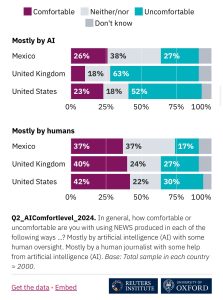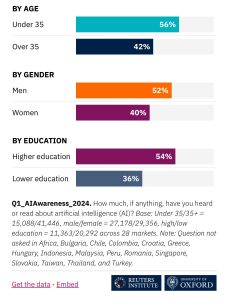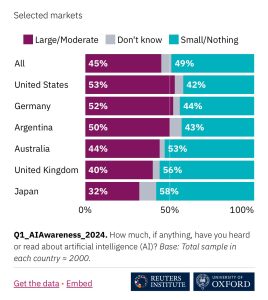Highlights
- 63% of UK respondents and 52% of US respondents uneasy about AI-produced news
- Misinformation concerns rise to 59% globally, 81% in South Africa
- Paid digital news subscriptions stagnant at 17% over three years
- News influencers increasingly shape news consumption on platforms like TikTok
As newsrooms globally work on how to incorporate artificial intelligence as a means of supporting reporting, a major new study has unearthed widespread public skepticism about deploying AI for news production
According to the annual Reuters Institute Digital News Report, fresh challenges are hitting media organizations already mired in struggling to engage audiences and lift revenues.
The far-reaching report, canvassing nearly 100,000 people across 47 countries, painted a picture of public concerns growing about AI’s role in journalism and the spread of misinformation online.
AI Mistrust Especially High for Political Coverage

The survey showed that 52 percent of the US respondents, and almost two-thirds in the UK, at 63 percent, said they would be uneasy about news produced mostly by AI, especially for sensitive topics such as politics.
“It was surprising to see the level of suspicion,” said Nic Newman, the report’s lead author. “People broadly had fears about what might happen to content reliability and trust.”
While less opposed to AI enhancing journalistic efficiency behind the scenes, the findings suggest a general public wariness around allowing algorithms too much editorial control.
Misinformation Fears Persist

The research also found, separately, that concerns about false or misleading news online increased 3 percentage points year on year to 59% globally.
That number jumped to 81 percent in South Africa and 72 percent in the U.S – both countries are holding votes this year.
Paid News Subscriptions Stagnate

Another key challenge identified was the stagnation in paid digital news subscriptions following pandemic-driven growth.
Across 20 countries studied, just 17% of respondents paid for online news – a proportion unchanged over the past three years.
In the U.S., a significant 46% of those with subscriptions paid discounted trial rates rather than full prices, adding further strain on news outlets’ reader revenue streams.
The Rise of News Influencers
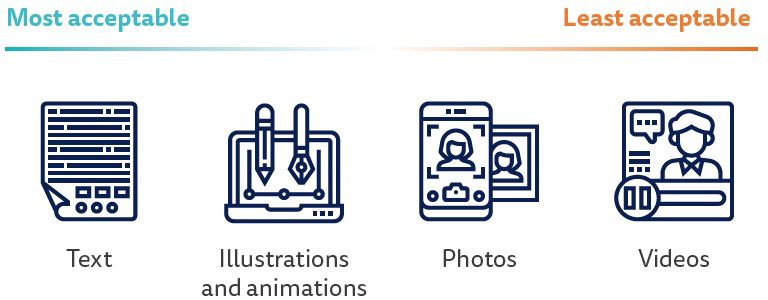
It has been noticed that individual personalities and commentators play an increasingly major role in shaping news consumption—more so among young audiences, particularly on platforms such as TikTok.
Completed by more than 5,600 news users on TikTok, 57 percent said they followed individual creators primarily for updates, against journalists or brands at 34 percent.
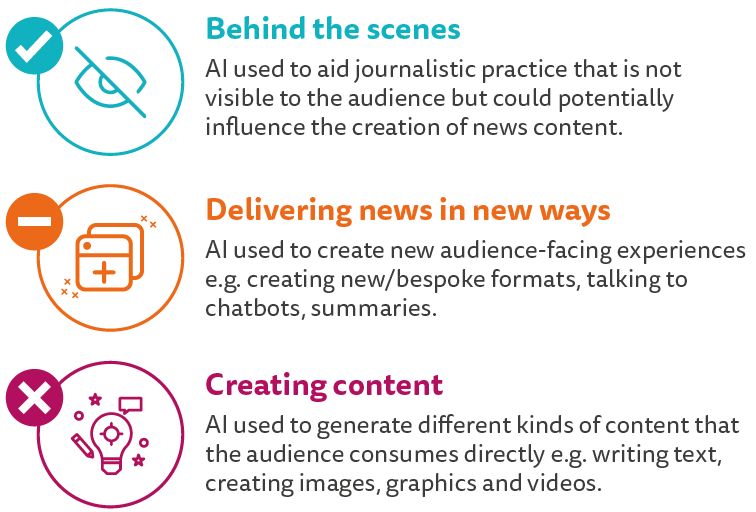
As Newman summarized, “Newsrooms need to build a direct relationship with their audiences while also strategically using the platforms to connect with people who are trickier to reach, like younger audiences.”
The findings suggest navigating the new AI reality, retaining trust amidst misinformation fears, monetizing digital subscriptions, and harnessing news influencers’ power will all be key priorities for media in the years ahead.
FAQs
What did the Reuters study find about public trust in AI-powered news?
The study found significant scepticism, with 63% of UK respondents and 52% of US respondents uneasy about news produced mostly by AI, especially on sensitive topics like politics.
How concerned are people about misinformation online?
Concerns about false or misleading news online increased to 59% globally, with higher rates in countries like South Africa (81%) and the U.S. (72%).
What is the trend in paid digital news subscriptions?
Paid digital news subscriptions have stagnated at 17% over the past three years, with many U.S. subscribers paying discounted trial rates rather than full prices.
How are news influencers affecting news consumption?
Individual personalities and commentators, particularly on platforms like TikTok, are playing a major role in shaping news consumption, especially among younger audiences.
Also Read: How Can AI Revolutionize My Smartwatch Experience? Unraveling the Dilemma
Also Read: TikTok Unveils Creator Rewards Program to Boost Monetization for Content Creators
Also Read: TikTok Ban Concerns Highlight Privacy and Education Debate


